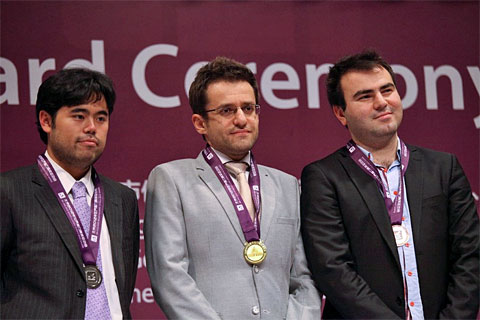White to move and mate in 3
Monday, December 31, 2012
Sunday, December 30, 2012
Saturday, December 29, 2012
Thursday, December 27, 2012
Wednesday, December 26, 2012
Tuesday, December 25, 2012
UVa 11472 - Beautiful Numbers | Solution
Problem Overview:
Name: UVa 11472 - Beautiful Numbers
Link: http://uva.onlinejudge.org/external/114/11472.html
Time Limit: 3s
Memory Limit:
My suggested solution:
Difficulty: Medium
Hint: This problem can be solved with dp and bitmask technique. A 3D array of size 100 * 2 ^ 10 * 10 (about 1M), which is acceptable in memory limit, is needed to store the results. Then, the array can be filled by a recursive formula called f(i, j, k) - number of ways to make a number with i digits, using j as a mask and k is the last digit. The mask is definited as usual, i.e. if i-th digit from right to left of the mask value in binary notation is 1, digit i was used before and was not otherwise. Now f(i, j | (1 << k), k) = sum of all f(i - 1, j, k - 1) if(k - 1 >= 0), plus sum of all f(i - 1, j, k + 1) if (k + 1 < n). Remember to handle the special case when i = 1, i.e. no leading zero is allowed in beautiful numbers. The final answer is sum of all f(i, (1 << n) - 1, j), i = 1..m, j = 0..n-1
Complexity: M * N * 2 ^ N
Algorithm: dp + bitmask
Related problem:
Name: UVa 11472 - Beautiful Numbers
Link: http://uva.onlinejudge.org/external/114/11472.html
Time Limit: 3s
Memory Limit:
My suggested solution:
Difficulty: Medium
Hint: This problem can be solved with dp and bitmask technique. A 3D array of size 100 * 2 ^ 10 * 10 (about 1M), which is acceptable in memory limit, is needed to store the results. Then, the array can be filled by a recursive formula called f(i, j, k) - number of ways to make a number with i digits, using j as a mask and k is the last digit. The mask is definited as usual, i.e. if i-th digit from right to left of the mask value in binary notation is 1, digit i was used before and was not otherwise. Now f(i, j | (1 << k), k) = sum of all f(i - 1, j, k - 1) if(k - 1 >= 0), plus sum of all f(i - 1, j, k + 1) if (k + 1 < n). Remember to handle the special case when i = 1, i.e. no leading zero is allowed in beautiful numbers. The final answer is sum of all f(i, (1 << n) - 1, j), i = 1..m, j = 0..n-1
Complexity: M * N * 2 ^ N
Algorithm: dp + bitmask
Related problem:
Sunday, December 23, 2012
Aeroflot Open 2013
After a period of speculation that the Aeroflot Open might be canceled, the Russian Chess Federation finally announced that the 2013 edition will take place from 12th to 17th February at the exhibition center InfoProstranstvo in Moscow.
The next edition will be dedicated to the 90th anniversary of the leading Russian airline company. The total prize fund of all tournaments is 150 000 USD.
Aeroflot Open is starting immediately after the International Chess Festival Moscow Open-2013.
The novelty is that the classical time control is abandoned and all events will be played with rapid and blitz time controls. Last winner of the “classical” Open was Polish Grandmaster Mateusz Bartel.
Saturday, December 22, 2012
GM Lazaro Bruzon defends the trophy in ITT Jahv McGregor Open
The 3rd ITT Jahv McGregor open chess tournament was held from 11th to 16th December at the Centro Comercial Bulevar Niza in Bogota, Colombia.
The tournament was played over nine rounds of Swiss pairings. 386 players from 14 countries competed, including 9 Grandmasters and 13 International Masters.
Top seed GM Lazaro Bruzon Batista from Cuba defended the last year’s trophy and signed another victory in the prestigious event by concluding the race with 8,0/9 points.
Peruvian Grandmaster Emilio Cordova is clear second half a point behind the winner.
Bruzon appears to be in excellent shape as he also won the 2nd Copa AES in Dominican Republic a couple of days before the ITT Jahv McGregor.
The U7 event had 21 players. Puerta Rendon Josue is the winner with perfect 6/6 score.
The U10 group had 36 players. Joseph Jimenez is clear first with 6/6 points.
AICF-AAI Chess Cup Round 1: Negi holds Wojtaszek
Grandmaster and Asian champion Parimarjan Negi got off to a good start in the AICF-AAI Chess Cup holding top seed Radoslav Wojtaszek of Poland to a draw here at the AAI institute.
The first round provided exciting games in the highest category tournament of the country with Abhijeet Guptaholding out Krishnan Sasikiran to a draw while Ukrainian Anton Korobov also signed peace with Evgeny Alekseev of Russia.
It was a tense affair for Negi after he made a slight error in the endgame arising out of a Grunfeld defense. Playing black the Indian said he was quite satisfied with his preparation. “I played a home-cooked idea which worked quite well for me in the middle game as I equalized quite easily. It should have been an easy draw but I made this slight error that gave Radek (Wojtaszek) some chances.
Friday, December 21, 2012
Magnus Carlsen to play at Parallels Summit 2013
Parallels Summit 2013 attendees will have the opportunity to test their chess skills against Grand Master Magnus Carlsen.
RENTON, WA – December 19, 2012. Parallels, the hosting and cloud services enablement leader, has announced a unique opportunity for Parallels Summit 2013 attendees to meet and challenge one of the smartest minds of our day, Magnus Carlsen.
Parallels Summit is the leading global annual gathering of the cloud industry, scheduled from February 4-6, 2013 at Caesars Palace in Las Vegas, Nevada.
At age 22, chess grandmaster Magnus Carlsen is the No. 1 player in the world and has recently become the highest ranked chess player ever.
Podebrady retrospect: Averbakh, Prague and Snowdrops in the snow

Snowdrops and Old Hands – Czech Coal Match 2012
| From December 7th to 16th the spa city of Poděbrady hosted a match between a rising generation of female chess players and chess legends of the 20th century. The former was represented by IM Valentina Gunina (Russia, rated 2517), IM Tania Sachdev (India, 2400), WGM Alina Kashlinskaya (Russia, 2344) and WIM Kristýna Havlíková (Czech Republic, 2310). They were trained by team captain GM Sergei Movsesian. The "Old Hands" were GM Oleg Romanishin (Ukraine, 2530), GM Fridrik Olafsson (Iceland, 2419), GM Vlastimil Hort (Czech Republic, 2455) and GM Wolfgang Uhlmann (Germany, 2319). The games were played at Hotel Zámeček in Poděbrady, the rate of play was 90 minutes for 40 moves, 30 minutes for the rest, with an increament of 30 seconds per move. |
Yuri Averbakh
Yuri Lvovich Averbakh, born February 8, 1922, in Kaluga, Russia, of a German Jewish father (originally named Auerbach) and a Russian Eastern Orthodox mother.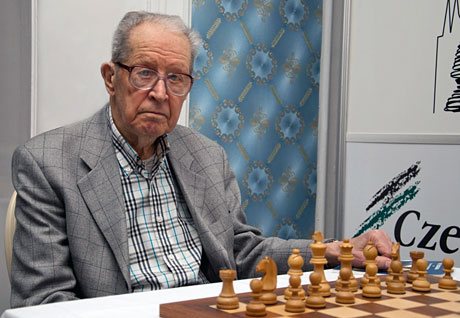
Averbakh's first major success was first place in the Moscow Championship of 1949. He became an International Grandmaster in 1952, and in 1954 won the USSR Chess Championship ahead of players including Taimanov, Korchnoi, Petrosian, Geller and Flohr. In the 1956 Championship he came equal first with Taimanov and Spassky. His other major tournament victories included Vienna 1961 and Moscow 1962. He qualified for the 1953 Candidates' Tournament and also for the 1958 Interzonal at Portorož. Averbakh is also a major endgame study theorist. He has published more than 100 studies, many of which have made notable contributions to endgame theory.
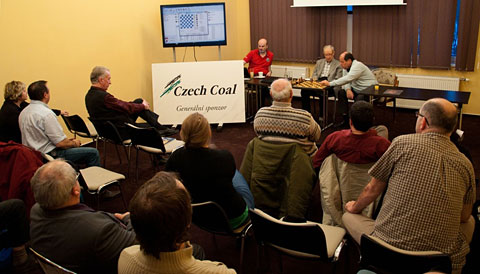
At ninety years of age Yuri Averbakh is the oldest living grandmaster of the world. He is still in great condition, able to travel, e.g. as a guest of the match Snowdrops and Old Hands, and even hold a lecture on the free day. In it he spoke about the Art of Chss, in the audience were GMs Vlastimil Hort and Fridrik Olafsson (in front row left in the picture above).
Caissa Chess Awards in Moscow
The Caissa Chess Award night, held in the Central House of Literature in Moscow on Monday, is aimed at popularizing and developing chess. The Award, a glass plaque with the chess goddess Kaissa engraved in it, was given to sixteen players, politicians, businessmen and journalists who had contributed significantly to the world of chess.
The event was attended by FIDE President Kirsan Ilyumzhinov, Russian Parliament Speaker Alexander Zhukov, Russian Deputy Prime Minister Arcady Dvorkovich, as well as a host of well-known politicians, athletes, members of business and intellectual circles, and of course the media.
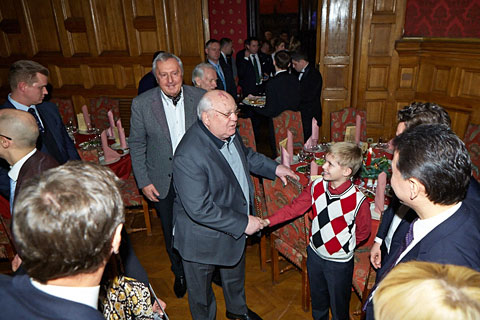
A special guest of honor: former President of the USSR Mikhail Gorbachev
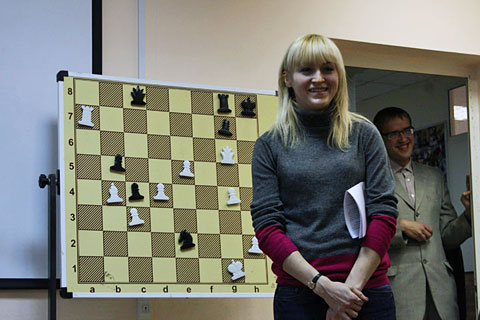
Before the ceremony recently crowned Women’s World Champion Anna Ushenina
showed her games from Khanty-Mansiysk at a master class...
1st Chairman’s Cup International Chess Championship
New tournament detail from chessdom.com:
The National Chess Federation of the Philippines is pleased to invite you to participate in the 1st Chairman’s Cup International Chess Championship to be held at the Teachers Camp, Baguio City, Philippines on January 13 – 21, 2013.
The 1st Chairman’s Cup International Chess Tournament will be played over 9 rounds using the Swiss System. The time control shall be 90 minutes for the whole game with an increment of 30 seconds per move starting from move 1. Draws are not allowed before the completion of Black’s 30th move.
The organizer shall provide free full board and lodging during the tournament for the first 15 GMs>2500 on the December 2012 FIDE Rating List.
Other Grandmasters, International Masters and other titled players may be given free accommodation subject to availability.

Thirty Thousand U.S. Dollars (US$30,000) in cash prizes shall be awarded:
1st: US$ 6,000
2nd: US$ 4,000
3rd: US$ 3,000
4th: US$ 2,000
5th: US$ 1,500
6th-13th: US$ 1,000
14th: US$ 900
15th: US$ 800
16th: US$ 700
17th: US$ 600
18th-20th: US$ 500
21st-22th: US$ 300
23rd-24th: US$ 200
Cash prizes shall be shared equally among players with the same score. For trophies, ties will be decided by calculating the average rating of the 8 strongest opponents, then if still tied, the 7 strongest, and so on.
Entry fee is free for Grandmasters and players with a FIDE Rating of 2500 and above.
For all other players based on the January 2013 FIDE Ratings list, the entry fee is as follows:
2450 – 2499: US$ 25 or P 1,100
2400 – 2449: US$ 50 or P 2,200
2300 – 2399: US$ 75 or P 3,300
2200 – 2299: US$100 or P 4,400
2199 below US$150 or P 6,600
The deadline for registration is January 1, 2013. Late entries will be accepted until January 5, 2012 with a late fee of $50.
NCFP Secretariat
Email : philchesssecretariat@yahoo.com
I look forward to welcoming you to Manila!
Prospero Pichay
Chairman / President
National Chess Federation of the Philippines
Aronian and Hou Yifan win blindfold in Beijing
(Source: ChessBase)
The Blindfold Events were held on Tuesday and Wednesday (December 18 + 19). It was won by Levon Aronian with a score of 5.5/7 points, half a point ahead of Hikaru Nakamura, who has come second in all three mind game chess disciplines: rapid, blitz and now blindfold. Bronze went to Shakhriyar Mamedyarov of Azerbaijan.
Prize giving: Silver for Nakamura, Gold for Aronian and Bronze for Mamedyarov
Thursday, December 20, 2012
Wednesday, December 19, 2012
Applying for an internship at Google
(Source: http://ecarmi.org)
Like most every Computer Science student looking for a summer internship, I applied to Google.
I submitted my application on their website on December 31st, 2010 and received a thank you email. About ten days later I was sent an automated email asking me to fill out a Google spreadsheet Beta candidate preference form.
I heard nothing for a month and a half. And then, on Friday, February 25th, at 5:06pm I got an email from member of the Engineering Staffing Team, Hadas:
Hi Evan,Thanks for your interest in Google!We’ve reviewed your resume and would like to learn more about you. We are interested in speaking to you about a possible summer Software Engineering Internship in one of our North American offices. To start the process we’d like to collect a bit of information from you:
I immediately filled out the forms and responded.
At 9:30pm that same evening I got another email back:
Hi Evan,Thank you for filling out the forms. I have forwarded all of your information to Becky (cc’d), the recruiter, who will be reaching out to you.Good luck :)
I emailed the recruiter, Becky, and the next day heard back from her. At this point I was increasingly impressed by their responsiveness. I had been talking to other companies and everyone had been very slow and unorganized responding to my emails.
How to Get an Internship at Google
Getting an internship at Google would certainly be a bright career stepping stone for any student. Not only would you perhaps build a doorway towards a long-term, full-time career with the search engine giant but you’d also have an impressive position on your resume that would help you land positions at many other companies.
You might imagine getting a Google internship is a competitive process with lots of steps. But once an understanding of its recruitment and hiring process is made, getting into Google as an employer would not be seem as an impossible undertakings.
Read the Directions Carefully
The hiring process for Google internships can be found the company’s official students/internship website, and the instructions are quite extensive. You’re being evaluated on your ability to follow instructions and think creatively from the moment you turn in your resume or CV. These guidelines are extremely specific on every count, and if you don’t follow them to the letter you’ll kill your chances before you begin.
For example, Google wants to you to report on every job you’ve ever held whether you think it relates to the Google position you’re applying for or not. For each position you are expected to offer a bulleted list of “concise, key accomplishments” as well as a description of “the impact your efforts had on your company.”
Here’s where the creativity comes in: trying to describe your “impact” at your summer McDonald’s job might be something of a challenge. You might have to think about how you stacked up to key metrics and find ways to phrase mediocre experiences in ways that read in impressive ways. Perhaps you didn’t just make burgers and fries. Perhaps you “routinely beat the clock to provide hot, quality food that exceeded customer delivery expectations, ensuring that our location became a preferred McDonalds store in our local area.” It may seem silly, but it’s all part of the game.
Garry Kasparov on FIDE and Istanbul Olympiad
The 13th world champion was not in Istanbul just to cheer on the Russian team and its new coach, his old trainer Yuri Dokhoian. Kasparov took part in complex negotiations to reform FIDE's rules on elections, stemming from lawsuits against FIDE during the 2010 Karpov campaign. In this exclusive interview we also get his thoughts on the Russian and Armenian teams, and even some chess.
The last time Garry Kasparov played in a chess Olympiad was in Bled in 2002, where he led Russia to a gold medal and took the top overall rating performance gold for himself, with a 2933 showing on board one. Incredibly, that was the last team gold for the Russian powerhouse, despite their coming into the last five Olympiads as the top seed by a wide margin. They fell short of gold once again in Istanbul last week, this time by a painfully close tiebreak margin. (And a sensational loss to USA after Russia had rolled over all the other top teams, including eventual winner Armenia.)
But even were they to ask Kasparov for a little of the old magic – he'd make a pretty good fourth board, we think, and with his old coach Yuri Dokhoian captaining the Russian team we could even imagine it – Kasparov was not in Istanbul for the chess. He cheered on his compatriots (only one of whom, Grischuk, played with him in Bled) over the final rounds. But Kasparov's primary mission was to attend the FIDE General Assembly and several meetings with FIDE and federation officials leading up to the GA. On the table, reforming and rewriting many of the rules that govern FIDE elections after the Court of Arbitration for Sport (CAS) in Switzerland ruled on several cases brought before it by FIDE and the campaign of Anatoly Karpov (in which Kasparov was an active supporter) in 2010.
After Kasparov arrived back home in Moscow, we spoke with him about his Istanbul agenda, what was accomplished, and even some chess.
Magnus Carlsen – 'I don't quite fit into the usual schemes'
He is by his own admission a chess genius, weaned on computers, a supreme expert
on openings, and the hardest worker amongst the top players. Actually,
when you have gone through this remarkable ChessPro
interview with Magnus Carlsen – which you must – you will recognize that all of the fairly plausible claims in our
initial statement are false – in fact the opposite is true.
From ChessPro, translated by ColinMcGourty
After the Tal Memorial in Moscow Magnus Carlsen gave a long interview which has only just been published. It was definitely worth the wait, as it provides a remarkable insight into what makes the Norwegian stand out in the world of chess. He claims to have essentially developed as a player without computers, and that he barely works on the game outside of tournaments. He also gives a detailed and thoughtful account of his cooperation with Garry Kasparov, where it’s clear he doesn't share what seemed to be Hikaru Nakamura’s view that there was little to be gained but opening knowledge.
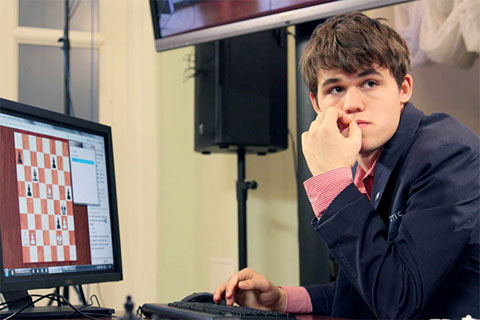
Magnus Carlsen talked to Evgeny Atarov of ChessPro for almost an hour, and the resulting interview covers a great deal of topics. As well as the highlights I’ve selected below he also talks, for instance, about the World Championship, poker, his fame in Norway and being accompanied almost everywhere by his father. The photographs of Carlsen at the Tal Memorial used here were also taken by Evgeny Atarov. We bring you this remarkable interview with the permission of our colleagues at ChessPro.
From ChessPro, translated by ColinMcGourty
After the Tal Memorial in Moscow Magnus Carlsen gave a long interview which has only just been published. It was definitely worth the wait, as it provides a remarkable insight into what makes the Norwegian stand out in the world of chess. He claims to have essentially developed as a player without computers, and that he barely works on the game outside of tournaments. He also gives a detailed and thoughtful account of his cooperation with Garry Kasparov, where it’s clear he doesn't share what seemed to be Hikaru Nakamura’s view that there was little to be gained but opening knowledge.

Magnus Carlsen talked to Evgeny Atarov of ChessPro for almost an hour, and the resulting interview covers a great deal of topics. As well as the highlights I’ve selected below he also talks, for instance, about the World Championship, poker, his fame in Norway and being accompanied almost everywhere by his father. The photographs of Carlsen at the Tal Memorial used here were also taken by Evgeny Atarov. We bring you this remarkable interview with the permission of our colleagues at ChessPro.
Cognitive Psychology of Chess
Dr. Fernand Gobet is a professor of Cognitive Psychology and an International Master. He is a former Swiss Junior Champion and Swiss Champion, and was co-editor of the Swiss Chess Review from 1981 to 1989. He wrote his Ph.D. dissertation on the memories of a chess player. He has written many books and articles about chess and psychology. He has been studying many aspects of chess psychology such as mental imagery, pattern recognition, and study and playing patterns of chess players.
After studying hundreds of chess players, Gobet has found a strong correlation between the number of hours chess players have dedicated to chess (deliberate practice) and their current rating. In one study of 104 players (101 males and 3 females), including 39 untitled players without any rating, 39 untitled players with ratings , 13 FIDE masters (FM), 10 International Masters (IM), and 3 GMs, he found that the unrated players reported and average of 8,303 hours of dedication to chess; the rated but untitled players reported 11,715 hours; the FMs reported 19,618 hours and the IMs reported 27,929 hours (no information on GMs). It took an average of 11,000 hours to reach 2200. One player needed around 3,000 hours to reach 2200, while another player spent more than 23,000 hours to achieve the same level.
The average master (rated 2257) had 7.0 years of serious practice. The average expert (2174) had 1.03 years of serious practice. The masters increased their rating an average of 7 Elo points per year of serious practice, whereas the experts only increased their rating an average of 1 Elo point per year of serious practice. Experts increased their chess-playing skill level very little with time, whereas masters kept increasing theirs.
After studying hundreds of chess players, Gobet has found a strong correlation between the number of hours chess players have dedicated to chess (deliberate practice) and their current rating. In one study of 104 players (101 males and 3 females), including 39 untitled players without any rating, 39 untitled players with ratings , 13 FIDE masters (FM), 10 International Masters (IM), and 3 GMs, he found that the unrated players reported and average of 8,303 hours of dedication to chess; the rated but untitled players reported 11,715 hours; the FMs reported 19,618 hours and the IMs reported 27,929 hours (no information on GMs). It took an average of 11,000 hours to reach 2200. One player needed around 3,000 hours to reach 2200, while another player spent more than 23,000 hours to achieve the same level.
The average master (rated 2257) had 7.0 years of serious practice. The average expert (2174) had 1.03 years of serious practice. The masters increased their rating an average of 7 Elo points per year of serious practice, whereas the experts only increased their rating an average of 1 Elo point per year of serious practice. Experts increased their chess-playing skill level very little with time, whereas masters kept increasing theirs.
Đại học Cần Thơ lần đầu đoạt ngôi Nhất ACM/ICPC với cơ hội cao vào Chung kết ACM/ICPC toàn cầu
|
||
Olympic Cuộc thi dành cho sinh viên CNTT quy mô lớn nhất và sôi động nhất
Olympic
Tin học Sinh viên Việt Nam đã qua hơn 20 năm liên tục với các cuộc thi
sôi động diễn ra tại các trường ĐH&CĐ trên khắp các tỉnh và thành
phố, là một phong trào thiết thực với sinh viên các trường Đại học &
Cao đẳng, là một trong những nguồn phát hiện và phát huy tài năng trí
tuệ của lớp trẻ Việt Nam bổ xung nguồn lực CNTT-TT phục vụ công cuộc
Công nghiệp hoá - Hiện đại hoá đất nước do Bộ Giáo dục & Đào tạo,
Hội Tin học VN và Hội Sinh viên VN đồng tổ chức. Trường Đại học Công
nghiệp Hà Nội đơn vị đăng cai đã tạo mọi điều kiện tổ chức Olympic và
ACM/ICPC tốt nhất.
OLYMPIC
Tin học sinh viên đã khẳng định phong trào học tập và giảng dạy CNTT-TT
trong các trường ĐH&CĐ ngày càng cần thiết, phong phú và thiết
thực. Tuy là cuộc thi mang tính chuyên môn cao nhưng đã lôi cuốn được
các trường, khoa không đào tạo chuyên ngành CNTT và sinh viên khối cao
đẳng cùng tham gia trong một sân chơi kỹ năng – trí tuệ chung của Việt
Kỳ
thi ACM/ICPC Việt Nam đã 5 lần trực tiếp tổ chức lần lượt tại Hà Nội
(2006), Đà Nẵng (2007), Tp Hồ Chí Minh (2008), Nha Trang (2009), Hà Nội
(2010) từ đây các sinh viên Việt Nam liên tục có mặt tại vòng Chung kết
ACM/ICPC toàn cầu. Đây là kỳ thi : trí tuệ - kỹ năng, phong cách làm
việc tập thể, tính hoàn thiện và từ đây các điểm còn yếu của sinh viên
Việt
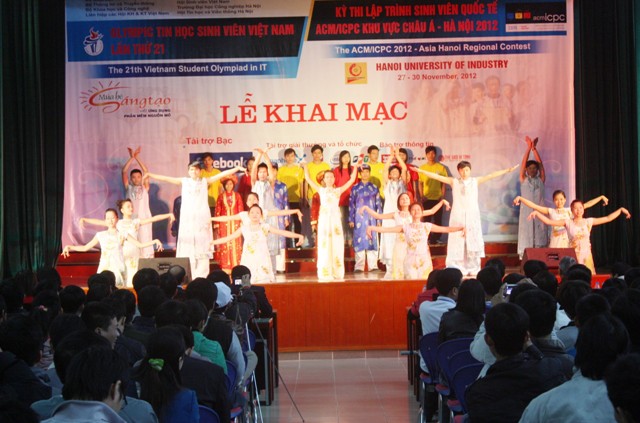
Quang cảnh lễ Khai mạc OLP’12 và ACM/ICPC Hà Nội 2012 | ||
Sinh viên Khoa CNTT & TT - ĐHCT đạt giải nhất khối ACM/ICPC HaNoi 2012
Olympic Tin học Sinh
viên Việt Nam (OLP) là sáng kiến của Hội Tin học Việt Nam, Hội Sinh viên
Việt Nam và Bộ giáo dục và Đào tạo nhằm động viên phong trào học tập
tin học và khuyến khích các tài năng tin học trẻ.

Bắt đầu từ năm 1992,
Kỳ thi đã được tổ chức định kỳ hàng năm với sự tham gia của đông đảo
sinh viên các trường Đại học và Cao đẳng trong cả nước. Từ năm 2005, sau
những năm thử nghiệm với tiêu chuẩn thi lập trình quốc tế ACM/ICPC cho
quy trình chấm thi và thi trực tuyến cho khối thi tập thể “lều chõng”,
từ năm 2006 Việt Nam chính thức được chấp thuận tổ chức Kỳ thi lập trình
sinh viên quốc tế ACM/ICPC (ACM International Collegiate Programming
Contest) Khu vực Châu Á. Từ năm 2007, Olympic Tin học sinh viên Việt Nam
đã kết nối với Kỳ thi ACM/ICPC thành một Hội thi tin học cho sinh viên
Việt Nam và Khu vực Châu Á. Quy mô và phạm vi của Kỳ thi mở rộng theo
quy định chung của Chính Phủ và bảo trợ của Bộ Giáo dục và Đào tạo, Bộ
Thông tin và Truyền thông, Bộ Khoa học và Công nghệ, Liên hiệp các Hội
Khoa học và Kỹ thuật Việt Nam, Trung ương Đoàn TNCS Hồ Chí Minh, Ủy ban
nhân dân tỉnh, thành phố đăng cai.
ĐH Cần Thơ về nhất ACM/ICPC cấp khu vực
(GD&TĐ)-Vượt
qua các đội tuyển đến từ nhiều nước trong khu vực, sinh viên Khoa Công
nghệ Thông tin và Truyền thông- ĐH Cần Thơ đã xuất sắc giành giải nhất
ACM/ICPC HaNoi 2012.
 |
| Đội CTU.Optimists , gồm Lâm Phan Việt (giữa), Lương Văn Đô và Trần Thanh Tú (trái) |
Đội tuyển CTU.Optimists – ĐH Cần Thơ gồm
các thành viên: Lâm Phan Việt, Lương Văn Đô và Trần Thanh Tú sẽ đang
được BTC xem xét để dự thi vòng chung kết toàn cầu ở Sankt-Peterburg,
Nga năm 2013.
SV Việt Nam đạt 1 giải Nhất kỳ thi ACM/ICPC Hà Nội 2012
Lễ bế mạc Kỳ thi Lập trình sinh viên quốc tế ACM/ICPC điểm
thi Hà Nội năm 2012 vừa diễn ra tối 30-11-2012, tại Đại học Công nghiệp
Hà Nội với sự tham dự của gần 390 sinh viên và 150 huấn luyện viên của
các đội tuyển từ Việt Nam, Trung Quốc, Hàn Quốc, Thái Lan, Indonesia,
Philippines, Đài Loan, Hồng Kông.

Đội tuyển CTU Optimists - Đại học Cần Thơ giành giải Nhất một cách "ngoạn mục". Ảnh: X.B.
12 giải thưởng đã được trao cho các đội tuyển xuất sắc nhất, gồm 1
đội Vô địch (đội GMT của Đại học Hồng Kông), 3 đội đạt Giải Nhất
(Celestial của Đại học Bắc Kinh, CTU Optimists của Đại học Cần Thơ,
HKUST_Optimus Prime của Đại học Khoa học & Công nghệ Hồng Kông), 4
đội giải Bạc (trong đó có 2 đội tuyển Việt Nam gồm HCMUS-Accepters của
Đại học Khoa học Tự nhiên TP.HCM, Spear of Triam của Đại học FPT) và 4
đội giải Đồng (gồm 2 đội Việt Nam là Mog của Đại học FPT và BK-headshot
của Đại học Bách Khoa, Đại học Quốc gia TP.HCM).
Subscribe to:
Posts (Atom)





